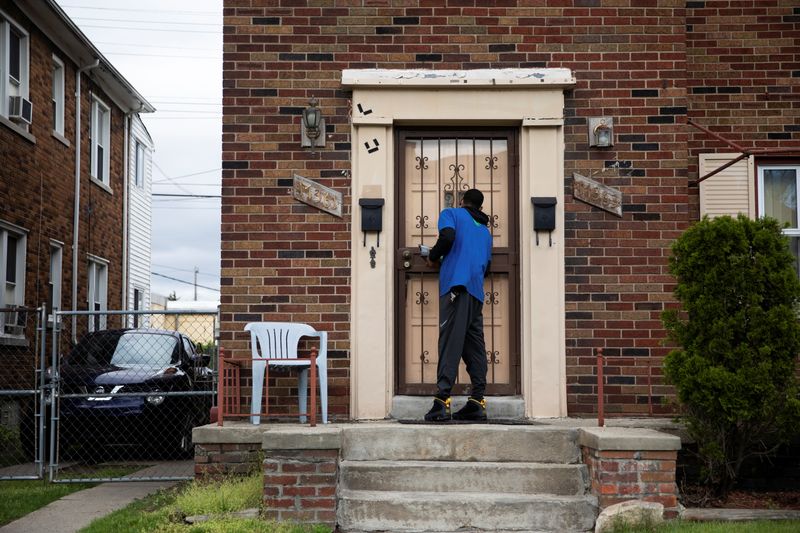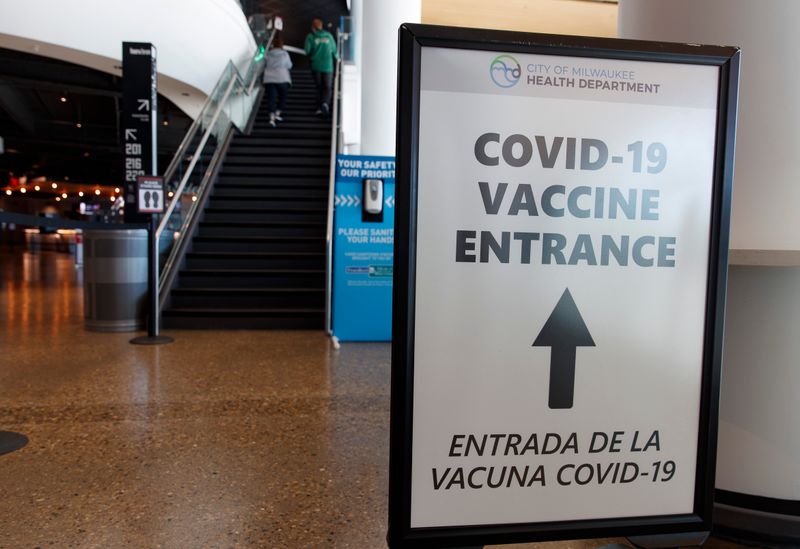By Sharon Bernstein and Michael Erman
(Reuters) - Robert Day walked up to a house in northwest Detroit, eager to talk about nearby COVID-19 vaccination sites and pitch a local program that pays $50 to anyone who brings someone to a clinic to get inoculated.
A man sitting on the porch, who refused to give his name, tore up the flyer Day had handed him and stormed inside.
"That’s just one person’s opinion,” said Day, a volunteer helping the Michigan city convince more people to get vaccinated, before he moved on to the next home on Tuesday.
The U.S. coronavirus vaccination campaign has reached a tipping point, with supply outstripping demand due to factors including ambivalence or skepticism about the vaccines as well as access issues. In recent weeks, the number of Americans seeking to be vaccinated against COVID-19 dropped by a third, according to the U.S. Centers for Disease Control and Prevention (CDC).
That is forcing public health officials to try new strategies to persuade people to get the shot, efforts that range from creative gimmicks to grassroots outreach resembling get-out-the-vote drives.
On Wednesday, New York Governor Andrew Cuomo said the Mets and Yankees Major League Baseball teams would give free tickets to fans who got vaccinated at the ball parks before games.
New Jersey and Connecticut are partnering with bars and brew pubs to offer a free drink to people who are newly vaccinated, while Maryland announced it would give $100 to state employees who get inoculated.
In Colorado, a non-profit organization is planning to reach out to rural conservatives - a group that includes many vaccine skeptics - at county fairs and rodeos.
Immunize Colorado also will use pop-up and Zoom events to appeal directly to immigrant groups and communities of color, where issues of access and distrust of the medical establishment have prevented many people from rolling up their sleeves.
“Those kinds of strategies - tried and true - are really going to get us to the last mile,” said Stephanie Wasserman, executive director of Immunize Colorado.
This week, President Joe Biden set an ambitious target of having more than 70% of U.S. adults get at least their first shot by the Independence Day holiday on July 4, shifting the country's inoculation strategy from mass vaccination sites to pharmacies and mobile and pop-up clinics with walk-in availability.
About 105 million U.S. adults are fully vaccinated and more than 56%, or 145.7 million people, have received at least one shot as of Tuesday, according to CDC data. (Graphic on global vaccines) https://tmsnrt.rs/3tUM8ta
Biden's goal of inoculating 160 million by July 4 will be challenging, but will help reduce circulation of the virus to very low levels and allow a return to normal life, experts say.
INCENTIVES AND MANDATES
The problem is that most adults eager to get the vaccines - which have not yet been authorized for children - have already done so.
Demand has dropped broadly around the United States, both in states that have been vaccinating at quicker paces, like Connecticut, New Hampshire and California, and states that have lagged, like Louisiana, Alabama and Idaho, CDC data shows.
In the most recent week, the drop in demand accelerated. Vaccine doses administered were down at least 11% in more than half the states and up more than 11% in just three.
Public health experts said that while federal money and publicity campaigns can help, the toughest work will need to be done by local health officials, doctors and pharmacists to reach harder-to-vaccinate populations.
Vaccine mandates by employers and universities also could make a difference, said Glen Nowak, a professor at the University of Georgia and former communications director for the CDC’s National Immunization Program.
He noted that historically U.S. child immunization rates were often below 75% until states started putting in place vaccination requirements to enter school.
It is unlikely that outreach campaigns will persuade those who are firmly opposed to vaccination in general, experts said.
Instead, they are targeting people who may fear the COVID-19 shot for a variety of reasons, including misinformation about safety and how quickly they were developed, as well as political opposition among many conservatives.
Alabama has been one of the slowest states to vaccinate, with just 42% of its adult population having received a shot by early May. Weekly vaccination rates there are off more than 40% since the beginning of last month.

Dr. Karen Landers, an Alabama public health official, said the state is looking at setting up clinics in schools, particularly after vaccines are authorized for 12 to 15 year olds, which is expected shortly.
"We have to continue to have access in every corner, but I think we also need to continue to combat hesitancy on an individual basis," she said.
